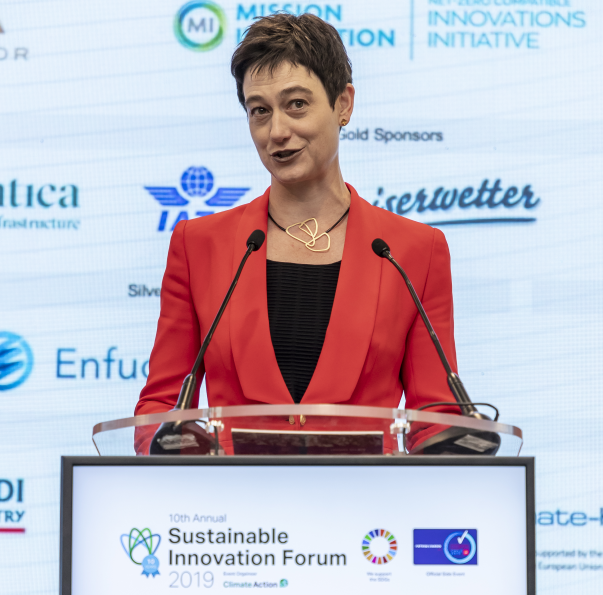Dr. Kirsten Dunlop on how EIT Climate-KIC is working with cities to address climate challenges
At the Sustainable Innovation Forum 2019, Climate Action caught up with Dr. Kirsten Dunlop, Chief Executive Officer at EIT Climate-KIC, to discuss how EIT Climate-KIC is working with cities to address climate challenges.

At the Sustainable Innovation Forum 2019, Climate Action caught up with Dr. Kirsten Dunlop, Chief Executive Officer at EIT Climate-KIC, to discuss how EIT Climate-KIC is working with cities to address climate challenges.
Q. Let’s start with some background on Climate-KIC and your history of accelerating the transition to a zero-carbon economy?
A. EIT Climate-KIC is a knowledge and innovation community established and funded by the European Institute of Innovation and Technology (EIT) in 2010. Our mission is to catalyse systemic change for climate action through innovation in areas of human activity that have a critical impact on greenhouse gas emissions – including cities, land use, production systems, and finance – and to create climate-resilient communities.
We are Europe’s largest public-private partnership with this purpose. We bring together large and small companies, scientific institutions and universities, city authorities and other public bodies, start-ups, and students. With over 350 formal organisational partners from across 25 countries, we work on innovation to mitigate climate change and to adapt to its unavoidable impacts.
In a global and local context of unevenly distributed needs, resources and political will for whole-scale change, Europe faces responsibilities, risks and opportunities that surpass anything it has already tackled. EIT Climate-KIC brings the will and ambition to support Europe’s leaders in tackling climate change through innovation, to enable Europe to fulfil its commitments in respect of the Paris Agreement, and to inspire global efforts by creating prosperity and wellbeing in the next economy. By focusing our efforts on systems innovation, we can achieve the critical structural and exponential changes that must occur both rapidly and on multiple fronts to address climate change.
Q. Climate-KIC has identified cities as one of the three major systems with the most potential in realising a climate-resilient society and net-zero carbon economy. What will be the key opportunities and drivers for realising this potential?
A. Yes, we focus efforts on catalysing systemic change in cities, land use, finance and production systems. We plan to introduce a fifth focus on water and marine systems. In 2019, we launched eight ‘Deep Demonstrations’ as a test bed environment for the systems transitions we need to see in these areas.
Cities are home to around three-quarters of Europe’s population and are responsible for a similar proportion of the region’s emissions. They have to change! The 15 cities in our Healthy, Clean Cities Deep Demonstration have embarked on an intense, ten-year journey to achieve carbon neutrality by 2030, using systems innovation as a key tool for delivering an inclusive transition focused on long-term well-being and prosperity for city inhabitants.
The approach they have all committed to is to tackle multiple societal challenges in an integrated, holistic way – e.g. looking at waste, mobility, heat, power, buildings, green infrastructure, fuel poverty, skills, jobs, urban food production, well-being, citizen engagement, etc., as a set of interrelated challenges. Participants range from national capitals, such as Amsterdam, Copenhagen, Edinburgh and Madrid, through to hubs of urban innovation, such as Leuven, Malmö, Skopje and Niš.
City transformations require a sense of mission, and they require us to work across many drivers simultaneously. Citizen engagement for democratic decision-making is key among these drivers, as the transformations needed will be rapid and radical. Policy innovation to catalyse impacts at scale through aggregation and replication will also be a deciding factor. Social innovation that help align the actions of people and organisations is another critical element, and of course we will need to unleash innovation in public finance. EIT Climate-KIC is working with cities willing to address these challenges, and connecting them into a wider community of experts and systems innovators working in this way.
Leuven is one of the cities taking part in our Deep Demonstration of Healthy, Clean Cities. Leuven took the novel step in 2013 of setting up Leuven 2030, a non-profit organisation representing the city government, citizen groups, knowledge institutions, companies, and investors, to deliver their commitment to carbon neutrality. It is highly unusual for a municipal authority to devolve responsibility in this way. Five years on, it is pushing forward the climate agenda very fast. Despite considerable population and economic growth, the city has succeeded in keeping its climate emissions flat since 2010. As part of our innovation community, Leuven has been able to connect with leading city innovators and to share knowledge and learn together through deliberate collaboration. This ability to move forward together is a critical part of the region’s capacity to develop climate solutions. There are many opportunities to learn and move faster for cities who are looking to embrace ambitious, system-wide approaches. You can read more about Leuven here.
Q. Do you foresee any challenges and barriers that will need to be overcome to achieve smart, sustainable cities? How can organisations like Climate-KIC seek to address them?
A. Time is short and there are many challenges. We know that business-as-usual and innovation-as-usual are not delivering a 1.5-degree world. And that we need to move away from incremental projects and policies towards innovation for systemic change. There is every reason to feel bewildered by the complexity and the uncertainty ahead of us.
Through Healthy, Clean Cities, we hope to tackle two of these challenges contemporaneously. The first requires an intentional focus on learning how to do the hard things we know need to be done. We are seeking to help cities place learning at the centre of their work, so that the execution - something cities are already experts at - is focused on the best possible actions. Intentional learning, linked to a larger transformational strategy, tends to be outside the comfort zone of how most cities operate. We need to tackle their culture and processes, while also recognise the capabilities needed for this work.
The second is the need to tackle basic questions on what work cities are advancing. Improvements in building performance need to be considered in the context of retrofitting communities and entire neighbourhoods. Electrification of mobility systems needs to connect to larger land use and development patterns, which are fundamental to reducing the need for cars. Addressing consumption-related emissions such as Scope 3 means considering how city tools for procurement and contracting can enable easier pathways for people.
City leaders need to reframe how they are thinking about the future and act on the risks of inaction. To help cities with this work, we bring diverse experts and innovators together in a co-creation process, one in which no single, predetermined solution works but in which we build tailored solutions together.
Q. As calls for climate ambition reach an all-time high, how important is cross-sector collaboration in driving the solutions? What role does collaboration play in delivering the goals of Climate-KIC?
A. Our Deep Demonstrations are deliberately designed to enable cross-sector collaboration to catalyse systemic change and help identify combinations of actions and investments that lead to pace and scale.
We need to get communities, organisations and national economies onto a 1.5C footing quickly. Learning how to achieve this is the real innovation of our time. For example, if we want to achieve climate impact, traditional models of funding and politics need to change. In this respect, Slovenia – as part of our Deep Demonstration of Circular, Regenerative Economies – is embarking on an incredibly bold experiment, connecting ministries and funding to break down siloes, and to capitalise on the benefits of circularity.
In Slovenia, the plan centres around driving circularity across forestry, the built environment, manufacturing, food, and mobility. A dedicated vehicle called the Slovenian Center for Smart and Circular Transition will serve as the beating heart and physical centre of the Deep Demonstration, bringing together the different stakeholders and opening up activities to the wider public.
EIT Climate-KIC will provide orchestration services in Slovenia and help design a broad-based portfolio of interventions that combine budgets and programmes across old siloes—covering various combinations of technology, policy, education, entrepreneurship, regulation, social innovation, citizen engagement and financial innovation. We will connect this project into our wider community of innovation actors and initiatives across Europe.
You can read more about the project here.
Q. What is the importance of events such as the Sustainable Innovation Forum in driving the transition towards smart, sustainable cities?
A. The Sustainable Innovation Forum presents an important opportunity for the public and private sectors to convene to exchange ideas and learnings. It is imperative that we create spaces for open dialogue, collaboration, and platforms for knowledge exchange, as cities work on the complex challenge of achieving transformation. SIF has a 10-year track record to this end.
EIT Climate-KIC was a Strategic Partner of the 10th annual Sustainable Innovation Forum which took place alongside COP25 on the 10-11 December in Madrid, Spain. To learn more about the Sustainable Innovation Forum 2020, visit the event's official website here.

_-_frame_at_0m5s_400_250_80_s_c1.jpg)




